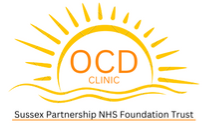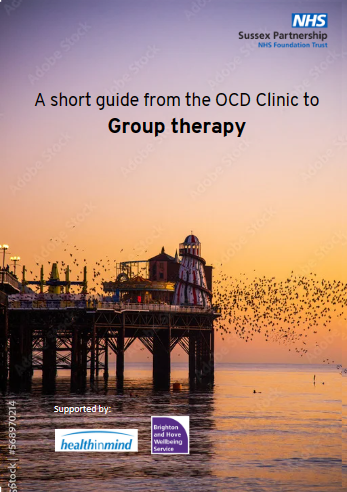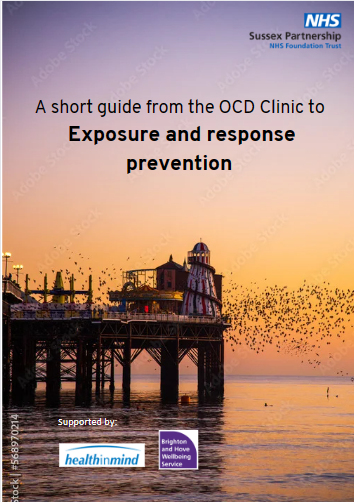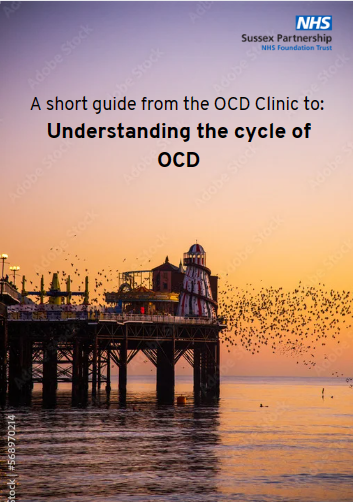Research and resources

Research is important to help us better understand OCD so that we can continue to develop and provide evidence-based treatments. Below, you will find summaries of recent research papers from the clinic, as well resources that you might find interesting or helpful.
Any resources and research on this page that is created by the clinic has been created by individuals with lived experience, and the clinic consults the OCD lived experience group before finalising a resource. Click here to find out more about our OCD lived experience group.
Although CBT is helpful for the majority of people who have OCD, not everyone benefits. To improve care for people with OCD we are involved in a number of research projects. People attending the clinic will be offered the opportunity to take part in these research projects if they so wish. Taking part in these projects is optional.
You are welcome to join our Research Network to find out about research studies taking place at Sussex Partnership NHS Foundation Trust.
Below is a summary of four recent research papers from the OCD Clinic.
A review and analysis of patients continuing with CBT for OCD
- Aimed to find out the reasons for, and the amount of people not continuing with CBT treatment.
- They reviewed 123 studies and 5627 participants experience. Save
- Those who attended group CBT sessions dropped out less than those receiving individual CBT sessions.
Patient Adherence to Cognitive Behavioural Therapy for Obsessive-Compulsive Disorder: A Systematic Review and Meta-analysis. Journal of Anxiety Disorders. 68. 102135. 10.1016/j.janxdis.2019.102135.Leeuwerik, T., Cavanagh, K., Strauss, C. (2019)
Participant perspectives on mindfulness-based CBT for OCD
- An analysis of interviews for participants who completed a 9-10 week intervention.
- The intervention integrated mindfulness with ERP
- They found that mindfulness was seen as both acceptable and beneficial.
Participant perspectives on the acceptability and effectiveness of mindfulness-based cognitive behaviour therapy approaches for obsessive compulsive disorder. PLOS ONE. 15. 10.1371/journal.pone.0238845. Leeuwerik, T., Strauss, C., Cavanagh, K. et al (2020)
Integrating mindfulness into ERP therapy to improve outcomes
- Highlights that only 50% of people with OCD recover after ERP
- Mindfulness when intergrated with ERP has the potential to improve acceptability and outcomes.
- On average only 6.5/10 sessions where attended, so more research is needed to confirm the true impact.
Mindfulness-based exposure and response prevention for obsessive compulsive disorder: Findings from a pilot randomised controlled trial. Journal of Anxiety Disorders. 57. 10.1016/j.janxdis.2018.04.007.
Strauss, C., Lea, L., Hayward, M. et al (2018)
Family accommodation and symptom severity
- This study was a meta analysis meaning that researchers used previous research to draw conclusions
- There was a relationship found between family accommodation and OCD symptom severity.
A meta-analytic review of the relationship between family accommodation and OCD symptom severity. Journal of Anxiety Disorders. 33. 10.1016/j.janxdis.2015.05.006.
Strauss, C, Hale, L., Stobie, B. (2015)
Clinic videos
The clinic has created a three part workshop with Sophie Ward, Psychological Wellbeing Practitioner, Health in Mind. To find out more and access these resources please see below:
-
Workshop 1 Part 1 - What is OCD? https://
youtu.be/ OmovEGRFYcY
This introductory session covers information about the course, Living with OCD, what is OCD? and the cycle of OCD (what maintains OCD?)
-
Workshop 1 Part 2 - What is OCD?: https://
youtu.be/ jQKL7noB_GY
Continuing looking at 'What is OCD?' and focusing on obsessions and/or compulsions.
-
Workshop 1 Part 3 - The Vicious Cycle of OCD https://
youtu.be/ 6QacNGj7A4s
The Vicious Cycle of OCD, including avoidance and other people and OCD.
- Workshop 2 Part 2 - How to overcome OCD? https://
www. youtube.com/ watch? v=loBnGus-Jks
How to Overcome OCD. This workshop will recap workshop 1 and will cover What is Exposure Response Prevention (ERP)? and our ERP treatments from the OCD Clinic.
- Workshop 2 Part 2 - What helps with OCD? https://
www. youtube.com/ watch? v=rmuXddciWW8
What helps with OCD? What do we offer in the OCD Clinic? The purpose of this workshop is to encourage reflection and to give you information about how we can support you at the OCD Clinic. It covers why Exposure Response Prevention (ERP)? (The Evidence) and ERP Treatment: What happens?
Access our OCD clinic Youtube Series here: OCD Clinic - YouTube
Coming soon...
- More videos in our series made with our lived experience advisory panel.
- If there are any resources that you would benefit from and don't see here, please do get in touch and let us know- we will see what we can do and get back to you!
Other resources that may be interesting or useful
- OCD UK: A UK charity that is completely service user led, everyone involved in the organisation has personal experience of OCD. They provide advice, information and support services for those affected by OCD and aim to end the trivialisation and stigma of OCD.
- OCD action: A UK charity with aims to make OCD better understood and diagnosed quickly. They have resources for learning about OCD including personal stories, and run support groups. They also advertise current research studies that are looking for participants.
- Mind, the mental health charity: A UK charity that aims to: stand up to injustices that make life harder for those with mental health problems, they offer support through information, advice and local services and they connect people who want to make a difference.


